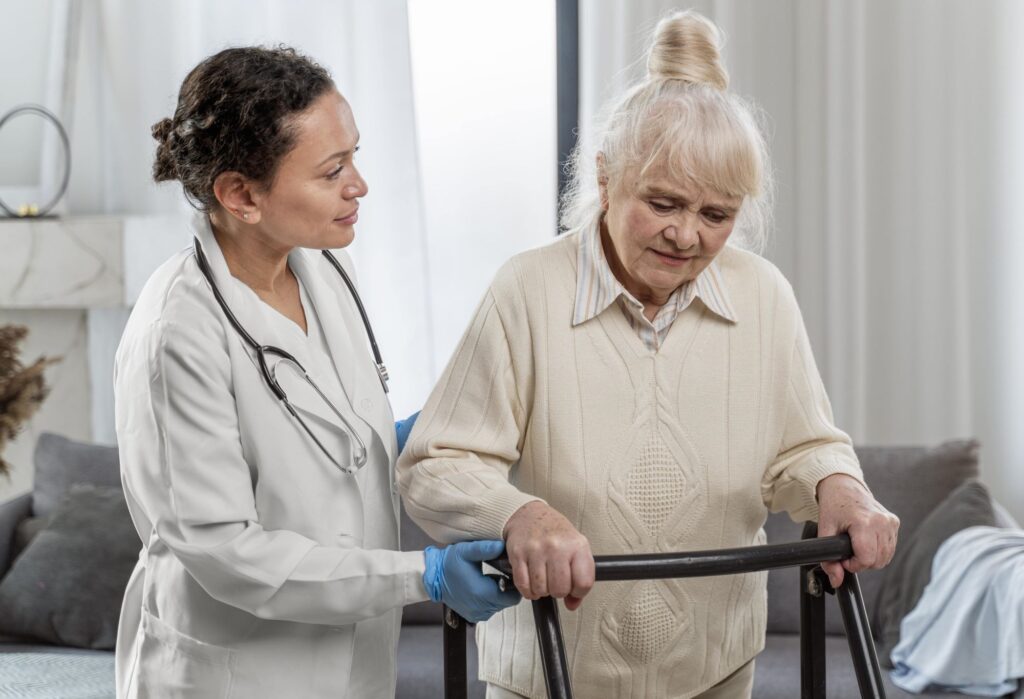Understanding Parkinson’s Disease: Why Home Health Care Matters
Parkinson’s disease is a neurological disorder that affects millions worldwide, bringing physical and emotional challenges to both patients and their families. Understanding and handling its symptoms is not easy for busy family members as it requires ongoing support and specialized care. This is where home health care becomes essential. By offering personalized assistance, caregivers can provide personalized care, comfort, and stability to cope with the condition and move toward healing.
Let’s understand in detail the impact of Parkinson’s disease and why home health care is needed to improve the quality of life for those affected.

A brief introduction to Parkinson’s Disease
Parkinson’s disease is a degenerative disorder of the central nervous system, primarily affecting movement. It occurs when nerve cells in the brain don’t produce enough dopamine, a neurotransmitter responsible for regulating movement and coordination. Although the exact cause is not the same for all, genetics, environmental factors, and aging may contribute to the disease’s onset. Parkinson’s often begins gradually and progresses over time while making daily tasks more challenging. Early diagnosis and a comprehensive care plan can help manage symptoms and enhance the quality of life.
Parkinson’s Disease Symptoms
- Tremors, especially in hands, arms, legs, or head.
- Slowed movement (bradykinesia), making tasks take longer.
- Muscle stiffness, causing pain and limiting range of motion.
- Impaired balance and coordination, leading to frequent falls.
- Changes in speech, often soft or slurred.
- Writing difficulties, such as smaller handwriting.
- Reduced facial expressions or “masked” faces.
- Sleep disturbances and fatigue.
Impact of Parkinson’s Disease on Daily Life
Challenges with Daily Tasks
This health condition makes everyday activities such as dressing, bathing, and cooking increasingly difficult. Simple actions like buttoning a shirt or holding utensils become frustrating.
As symptoms progress, individuals start needing more assistance with daily routines, leading to a reduced sense of autonomy.
Fine Motor Skill Impairment
Tasks that require precise movements, like writing, eating, or using a phone, become challenging as fine motor skills decline. This results in issues like unintended hand movements, slower actions, or difficulty gripping objects, which add stress to daily routines.
Speech and Communication Difficulties
Parkinson’s also affects vocal volume and clarity which makes it harder to communicate effectively. The reduced range of facial expressions, known as a “masked face,” can further limit nonverbal cues which cause patients to feel misunderstood or isolated in social settings.
Increased Fall Risk
Impaired balance and coordination make individuals more prone to falls and injuries. This is especially a greater risk for elderly people who are majorly vulnerable to fall injuries. Moving from one place to another becomes more complex, often requiring home modifications and mobility aids to ensure safety.
Emotional and Psychological Impact
Parkinson’s not only impacts physical health but also emotional well-being. The progressive loss of abilities and autonomy leads to anxiety, depression, and frustration. The fear of burdening others further heightens stress and feelings of isolation.
Dependence on Assistive Devices
Many individuals turn to adaptive equipment, such as walkers, specialized utensils, and home modifications, to complete daily activities. While these equipment are for one’s benefit, this dependence is sometimes emotionally challenging as patients adjust to relying on these tools for tasks they are used to accomplish independently.
Strained Relationships and Social Life
Physical limitations can hinder participation in social activities and thus have a great impact on social life. Communication issues and mobility restrictions may also lead to reduced social interactions, impacting the individual’s support network and increasing feelings of isolation.
Role of Home Health Care in Managing Parkinson’s Disease
Personalized In-Home Assistance
Parkinson’s disease home care professionals provide individualized support with essential daily activities, such as bathing, dressing, and meal preparation, enabling patients to maintain dignity and comfort within their familiar surroundings.
Medication Management
Professional caregivers assist with organizing and administering medications, ensuring consistent dosing schedules, and reducing the risk of missed doses or interactions, which is crucial for managing Parkinson’s symptoms effectively.
Ongoing Symptom Monitoring
Caregivers monitor patients’ symptoms closely and can respond quickly to any changes, helping prevent complications, manage fluctuations, and avoid potential medical emergencies.
Reduced Hospital Visits
By addressing symptoms and providing medical support at home, they can help minimize the need for frequent hospitalizations, saving patients and families the stress and expense of emergency care.
Support with Mobility
Home health care providers also offer guidance on exercises that are aimed at improving strength, balance, and flexibility to help patients maintain mobility, reduce stiffness, and lower the risk of falls.
Emotional and Mental Well-being Support
Compassionate caregivers not only offer companionship care but also emotional support, creating a positive and caring environment that can improve patients’ moods and reduce feelings of isolation or depression.
Family Support and Relief
Home health care relieves family members of primary caregiving duties, allowing them to focus on quality time with their loved ones without the additional physical and emotional stress of caregiving.
Conclusion
The impact of Parkinson’s’ disease leaves a person with several health issues that interfere with their daily lifestyle. As handling these issues and providing constant support to the affected person is not easy for his family members, home care service providers are becoming a preferable choice in today’s time.
If any of your family members are also experiencing the effects of Parkinson’s disease, you can hire home care professionals at Family Ties Home Care for reliable services!
